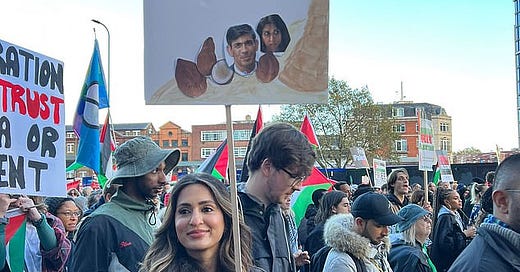The coconut sign protestor, Marieha Hussain has been charged. Meanwhile, Suella has been called unlawful by the High Court.
SLAMMING THE IRONY BUTTON UNTIL I EXPLODE
The irony hasn't gone unnoticed.
For those who don’t remember, 37 year old teacher Marieha was photographed holding a placard with images of Rishi Sunak and Suella Braverman as coconuts falling from a tree.
The Met police then tweeted that they were looking to find and question her. Then, there was silence — but now we finally have an update. She has been charged for saying something my aunty used to call me when she teased me.
Meanwhile, Suella Braverman has been called unlawful by the High Court, for criminalising protests.
So, what’s legal then?
At best, this is all confusing — at worst, it is a mirror held up to corruption.
The crackdown on Marieha’s sign came off the back of Suella’s criminalisation of what she called ‘hate marches’. In June 2023, Suella made changes to the Public Order Act, which meant police could restrict or stop a protest if they believe it could cause “more than minor disruption to the life of the community”.
They were given the power to arrest anyone taking part in a protest, or even anyone encouraging others to take part.
She passed this bill unlawfully, because it was rejected at the House of Lords, and so she used secondary legislation to pass it. This is a way to pass something with less scrutiny — it is simply a way to change or fill in details of acts that already exist.
Primary is to pass an act, secondary is to make a change or amend to an act.
Okay, we all learnt something there we didn’t want to, but it’s the core argument to why she has been threatened to court in October 2023 and then ultimately how the High Court — one of the highest courts of law in the UK — has called her actions unlawful.
Good. In too many ways, she is unlawful.
But let’s bring this back to Marieha — what does this say about her charge?
Firstly, the term ‘coconut’ isn’t a slur, but an insult. It is racialised — it suggests that someone is a person of colour on the outside and white on the inside. It’s the reason I refused to eat Bounty chocolate as a child.
In my experience, it’s been bandied around people of colour communities to each other, in a way to besmirch our ethnic roots. It’s most definitely hurtful — at a time when many South Asians were trying to understand their British-ness around the 80s and 90s, it was a way of discrediting a large part of that identity.
It’s no longer a typically used phrase, and like many moments of growth through shared stories of immigration, activation and solidarity, a lot of the South Asian community changed their use of language.
Looking at this usage in particular though, it’s very obvious what it means — the white part of the coconut is white supremacy. Like many times the word has been used, it points out our privilege in the way we speak, dress, eat, hear, accept and so on.
The reality is, the word coconut is a tool to point out white privilege in a community that already reeks of the rotting remains of imperialism, drenched in gold jewels.
This is privilege, white access, supremacy, wealth and conservative rule. This is the governing body of the UK. This is a disgrace.
Marieha should not be charged. And there is now a call to get her case dropped — take action on Instagram and Twitter.
Before South Asians especially run to the police crying ‘they called me a coconut’, we need to understand how ‘good immigrant’ values have skewed our beliefs into becoming conservative in the first place.
And how many of these conservatives rule the wealthy class from the very countries you buy the coconuts that we mock them with. This access to wealth is their access to supremacy, and therefore their access to power — especially in the land that colonised their people. The very people they colonise with money and neo-colonial tactics.
So, yes Suella Braverman is a coconut. And so is Rishi Sunak.
Those statements are not deserving of criminalisation, but instead re-interpretation in the face of white supremacy hiding in brown skin.







